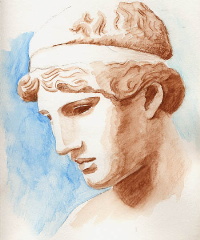From denial
From Bob Herbert's column in yesterday's NYT:
Packed with hot and filthy evacuees (and crates of rapidly souring milk), the truck crossed a bridge from New Orleans to Jefferson Parish, where the desperate occupants were promptly and grotesquely humiliated by several heavily armed plainclothes officers.Kevin Drum points to this Pew Poll:There were dozens of men, women and children in the truck when it was stopped. They were hungry, thirsty and frightened. It should have been obvious to any sentient being that they were fleeing the flood. Nevertheless, said Nicole, they were ordered out of the truck at gunpoint, with their hands up. One young man was thrown to the ground. The others were ordered to get on the ground, face down.
The occupants of the milk truck were black, and they were in dire need of assistance. But in the midst of one of the greatest emergencies in the nation's history, the opportunity to gratuitously humiliate them proved irresistible.
"They laid us out on the ground," said JoAnn. Her voice quivered and tears began to leak down her face. "I was pleading. I was saying, 'Sir, please - - ' And then we all went to praying. Crying and praying.' "
"We were all praying," said Nicole, "because we were afraid, the way they were acting, that they would shoot us."
Eventually, the officers let the group go. No one was charged with any crime. "They even helped us start the milk truck," Nicole said. "The last thing they told us was, 'Y'all get on out of here. And don't come back.' "
In addition, blacks and whites draw very different lessons from the tragedy. Seven-in-ten blacks (71%) say the disaster shows that racial inequality remains a major problem in the country; a majority of whites (56%) say this was not a particularly important lesson of the disaster. More striking, there is widespread agreement among blacks that the government's response to the crisis would have been faster if most of the storm's victims had been white; fully two-thirds of African Americans express that view. Whites, by an even wider margin (77%-17%), feel this would not have made a difference in the government's response.I would like to hook the 77 percent of whites who say race made no difference to a polygraph; I'd like to be able to figure out how many of them just aren't paying attention, how many are holding their hands over their ears and yelling "la-la-la, I can't HEAR you.. OH SAY CAN YOU SEEEEEE" and how many of them know damn well that race was a major factor but will never admit it in a million years.



1 Comments:
Racism certainly made a difference in some of the interactions, such as the Gretna Sheriff closing down the bridge. Would the emergency response have been swift and efficient if racist feelings were suddenly to disappear? I don't think so. There were a lot of people who wanted to help, white and black. There were lots of resources in place. People trying to help. Lots of people gave money. I don't know where it all went, but I don't see the racism there.
Basically, this thing was screwed up because of complacency, turf wars and gross incompetence. Those issues aside, the collapse of transportation and communication was total. Such storms are difficult to prepare for.
One thing people aren't necessarily aware of. As of the last census, at least 2/3's of New Orleans population self-identifies as African American. Probably 80%, including Hispanic immigrants, would be seen as people of color. I'm not sure the makeup of the refugees varies much from that percentage, although I'm sure there is self-segregation among refugee groups.
Anybody who loses their house and their car and all social support is likely to be poor, hungry and afraid. There but for fortune ...
Post a Comment
<< Home